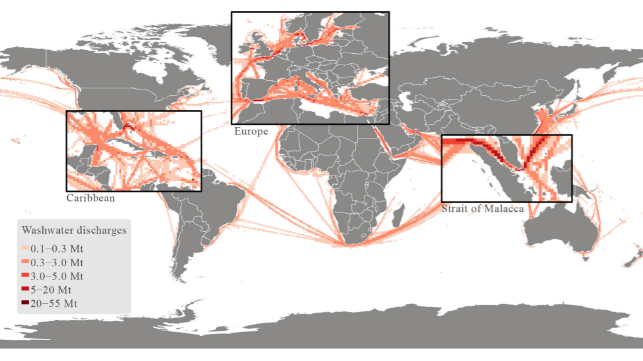New Report Highlights Scale of Scrubber Washwater Discharges

A new report on scrubber washwater suggests that shipping now produces nearly as many tonnes of the effluent in a year as the cargo it carries.
Based on numbers from the pre-COVID era (2019), the team at the International Council for Clean Transportation calculated that scrubber-equipped ships produce about 10 gigatonnes of cargo per year. This is nearly as much as the 11 tonnes of cargo handled by the maritime industry each year, and about 80 percent of it is released within 200 miles of shore, the group says.
The impact is not spread evenly: the busy shipping lanes near the Panama Canal and the Strait of Malacca see far more scrubber washwater than quieter coastal areas. (ICCT has set up an interactive map to show the alleged regional impacts.)
The authors caution that the contents of scrubber washwater may harm corals, and that the PAHs and heavy metals contained in the discharge may be linked to cancer in marine mammals.
ICCT also contends that while scrubbers can reduce SOx, their emissions of carbon dioxide, particulate matter and black carbon are all higher than what the ship would produce if it ran on MGO rather than (scrubber-equipped) HFO.
The organization suggested that IMO could immediately issue a call for ships to stop releasing scrubber washwater in IMO-designated Particularly Sensitive Sea Areas (PSSAs), like the Great Barrier Reef. The IMO could then move to ban the use of scrubbers as a means of compliance with fuel sulfur standards, and require that ships use cleaner fuels at all times. Countries and ports could also ban scrubber discharges in their waters (as several already have). Flag states could agree to phase out the use of scrubbers on ships flying their flag.

that matters most
Get the latest maritime news delivered to your inbox daily.
However, the Clean Shipping Alliance - the industry association for scrubber usage - pushed back on ICCT's new report, suggesting that it contains "too many errors."
“The CSA welcomes all scientific inquiries on scrubbers that are objective and well-researched. However, in the case of ICCT’s report there appears to be too many errors – including very high assumptions used in their calculations – to justify the policy recommendations they have suggested,” wrote CSA. “Looking first at water quality, the studies quoted in the report used very small and outdated sample sets, even the 2020 study has samples from only two ships in 2014."
